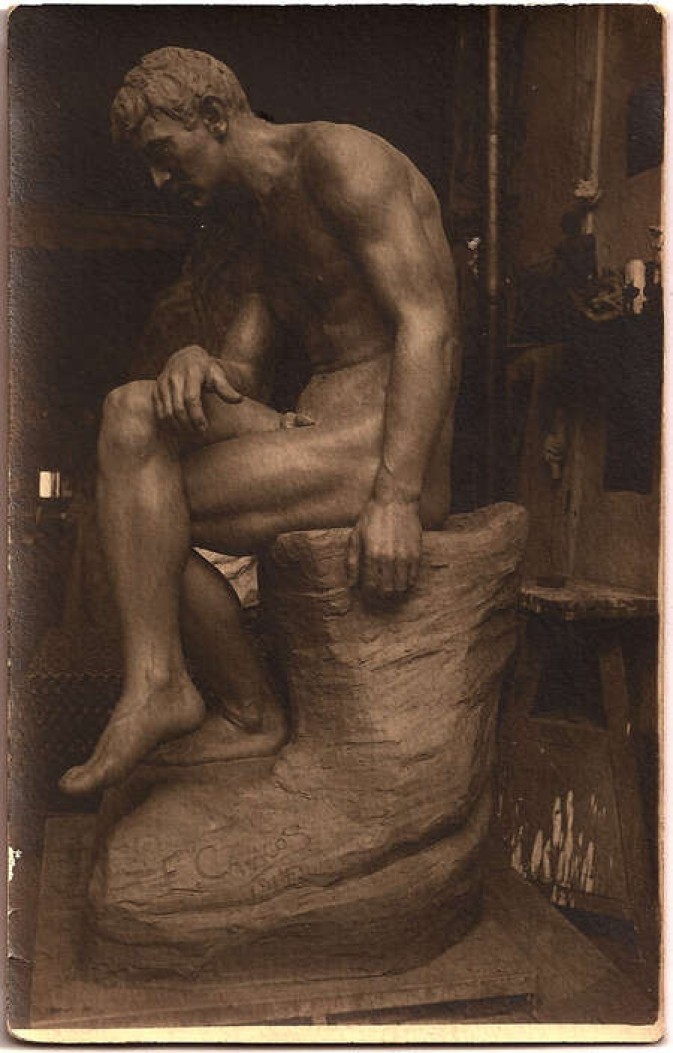The Thinker, 1914, by Emmanuel Andrew Cavacos
Emmanuel Andrew Cavacos was born in Potamos, Kythera, on February 10th, 1885. He emigrated to the United States of America, when he was sixteen years old, and settled in Baltimore, in the suburb of Hampden, where his brother Constantine was living. Another brother Theodore also chose to live in Baltimore. (Theodore was married to fellow Kytherian Pothiti Chlentzos). In Baltimore he formed a close friendship with Charles Fitzpatrick, with whom he communicated for many years. Photographs and Arts Programs which Cavacos sent to Fitzpatrick form the basis for this (preliminary) biographical sketch.
Having displayed a decided artistic aptitude, he was sent to the Maryland Institute to study painting. He devoted four years to this pursuit, whilst at the same time experimenting with sculptural modeling. Ephraim Keyser, the veteran Baltimore sculptor, who for many years was Director of the Rinehart School of Sculpture at the Maryland Institute, was so impressed with the quality of his clay sketches that he advised him to give up painting and devote himself exclusively to sculpture.
Cavacos took this advise, and he made such rapid progress as a student of Ephraim Keyser, that in 1911 he was awarded the Rinehart Scholarship, which enabled him to go to the Beaux Arts School in Paris. In Paris he was known as Emmanuel Andre, Andre being the French version of his middle name, Andrew.
In 1913, one of his works, Aspiration received an Honorable Mention at the Salon des Artistes Francais. The next year his Thinker attracted great attention at the Paris Salon. The first of this “Thinkers” is housed at the Enoch Pratt Free Library, and the second at the Peabody Institute in Baltimore.
In Paris, On October 2nd, 1915, Cavacos married Pauline Pradelle. Pauline was a professional pianist. She practiced her art in the studio where Emmanuel executed his sculptures.
His work made him a well known figure in the art colony of Paris, and he was commissioned to do the portraits of a number of notable citizens, including Mlle. Mistinguett, a prominent actress; Bucot, and Marcelle Ragnon. In 1925 he received a silver medal for a fountain at the International Exhibition of Decorative Arts in Paris. As a tribute to his ability, in 1927, the French Government bestowed upon him the decoration, Officier de l’Acadamie.
In subsequent years he exhibited annually in the Salon, and also at the Salon des Humoristes de Paris, where his dancing figures were highly praised.
His work is in a number of important collections, including that of Queen Marie of Rumania, who purchased one of his marble figures, Grief.
Cavacos’ sculpture has been praised for its variety, able craftsmanship, and for the sense of rhythm it conveys. The French critics emphasized its inherently poetic qualities.
In 1930 Cavacos returned to the United States for the first time in eighteen years. His work was exhibited at the Baltimore Museum of Art in March of that year. His work was also shown in New York, and later in the year at Homeland. A group of 17 of his sculptures were also placed on display in the National Sculpture Society Exhibition in San Francisco. In May, 1930, he and his wife returned to Paris.
Information about Cavacos post 1930 is difficult to obtain. Hopefully someone can shed more light on his life, in particular the period from 1931 – 1976.
We do know that when members of his family died, Cavacos undertook to create a beautiful monument, and to send it to be erected in the Greek section of a Cemetery in Baltimore, where it still stands today.
It seems that his interest in sculpture continued until well into his old age. When granddaughters of Charles Fitzpatrick (his Baltimore friend) visited him in Paris in 1969, they were photographed with him in his art studio. Many sculptures are visible in the room.
Emmanuel Cavacos died in 1976, aged 91.
Background to the biographical sketch, above
Information about Emmanuel Cavacos is not very extensive. Thankfully, Emmanuel seems to have established a friendship with a Baltimore resident called Charles Fitzpatrick. After Cavacos moved permanently to France he continued to correspond with him. Mike Fitzpatrick (aka Piedmont Fossil), Charles Fitzpatrick’s grandson takes up the story. “Cavacos sent photographs of his studio and his sculptures and even an invitation to his wedding in October 1915. Considering that the wedding took place across the Atlantic and the great time and expense it would require to go there -- not to mention that fact that by then France was deep into World War I -- my grandfather was unable to attend. In 1930 Cavacos made a return visit to the United States for a couple of exhibitions, one in his old hometown of Baltimore and one in New York. I don’t know how successful his exhibitions were considering they took place during the first year of the Great Depression, but today his sculptures, if they can be found at all, seem to sell for between several hundred and several thousand dollars each. In the late 1960s my two sisters traveled to Europe and, at the request of my grandfather, they stopped by to visit (the by that time elderly) Mr. Cavacos at his Paris home”.
Thankfully Mike Fitzpatrick has posted the Cavacos photographs from that time on flickr
http://www.flickr.com/photos/piedmont_fossil/sets/72157594585161747/
“Most of the photos in this set were sent to my grandfather by Emmanuel Cavacos soon after he moved to Paris. Almost all of them are inscribed on the reverse in the artist’s own handwriting.”
Cindy Anderson, is a fiancee of Pete Capsanes, who is the grandson of Theodore Andrew Cavacos, brother to Emmanuel and Constantine. These are all Baltimore Cavacos Kytherians. Cindy wrote to KAW:
"We just had Pete's family here and were talking about Emmanual Andrew Cavacos which is Pete's Great Great Uncle and the sculptor who ended up migrating from Greece, to Maryland back to Paris where he died. We have many of his sculpted pieces in the family".
